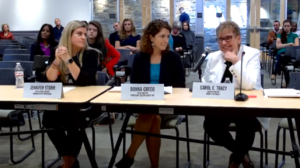
Victim rights advocates Jennifer Storm, Donna Greco & Carol Tracy testify at a policy hearing on rape culture.
On Friday, WLP Executive Director Carol E. Tracy formally testified about the legal history of rape culture at a policy hearing organized by Senators Katie Muth (D-Berks, Chester, Montgomery) and Tim Kearney (D-Chester/Delaware) and held in Phoenixville, Pennsylvania.
The testimony was co-authored by Tracy and Managing Director Terry L. Fromson.
One way to think about “rape culture” is as a set of social beliefs about sexual violence that serve to enable sexual violence. We witness rape culture in action when we hear people blame a sexual assault on a victim’s behavior instead of the perpetrator’s actions. In court, we witness rape culture when a judge values the potential future of a convicted offender over the healing of a victim. Living in a rape culture means many people hold false ideas about rape, from its prevalence to how rape typically happens to who is most likely to commit sexual violence.
Living in a rape culture also means anyone reporting an assault risks being disbelieved—with both the risk of being assault and of being disbelieved fluctuating according to the survivor’s identities and circumstances around the assault. Living in a rape culture means only a small percentage of people who experience sexual violence report to authorities, and a small percentage of those reports leads to a conviction.
Excerpt of our testimony:
In the current public discourse about sexual assault there is discussion of the prevalence of sexual assault and the perspective that sexual assault complaints are viewed with suspicion. However, there is very little analysis about why: why mostly women are frequently prey to sexual assault and why their conduct is examined and why their credibility is scrutinized. It doesn’t matter if it is an allegation against a famous television star, an athlete, student, stepfather, or guy next door, when a woman alleges sexual assault, her credibility is severely scrutinized to unearth a possible lie. The focus is on the victim’s behavior rather than the offender’s conduct. Simply put, society credits the male denial over the female’s allegations
To unravel why rape victims are regarded as liars, it is useful to understand the historical underpinnings of laws prohibiting rape which led to the historic bias against sex crimes and the victims of sex crimes in the criminal arena, because that is where it all started. This historical context has influenced the way sex crime laws are written by lawmakers and enforced by law enforcement and the courts, and rape culture in society generally Sexual assault is unique as a crime of assault in that it developed as a crime against property rather than a crime against a person. Under English common law, from which our laws developed, a woman’s chastity was essential to establish patriarchal inheritance rights, and thus a daughter’s chastity was viewed as the property of her father and was transferred by the father to the man who would become her husband.
Rape was the theft of this property. The bodily integrity of the woman was irrelevant. Only virgin females could be raped. Men certainly were not considered rape victim under the law. Married men were free to rape their wives because marriage was the irrevocable implied consent to sexual intercourse by a wife to her husband.
Any sexual behavior involving the marriageable daughter, consensual or rape, could jeopardize the family’s economic security, so there was incentive to assure would-be suitors of the virginity of marriageable daughters, whether true or not.
A marriageable daughter who was raped would be blamed for the economic downfall of her family line. In short, rape laws were created to protect the economic interests of men. Bodily integrity of the female was irrelevant.
Victim blaming and presuming untruths about a female’s virginity undoubtedly had its origins here.
You can download a PDF of our testimony here and watch video of the entire hearing here.
The Women’s Law Project is a public interest law center devoted to defending and expanding the rights of women, girls, and LGBTQ people in Pennsylvania and beyond.
Sign up for WLP’s Action Alerts. Stay up to date on issues and policy by following us on twitter liking us on Facebook and following us on Instagram.
We are a non-profit organization. Please consider supporting equal rights for women and girls by making a one-time donation or scheduling a monthly contribution.


